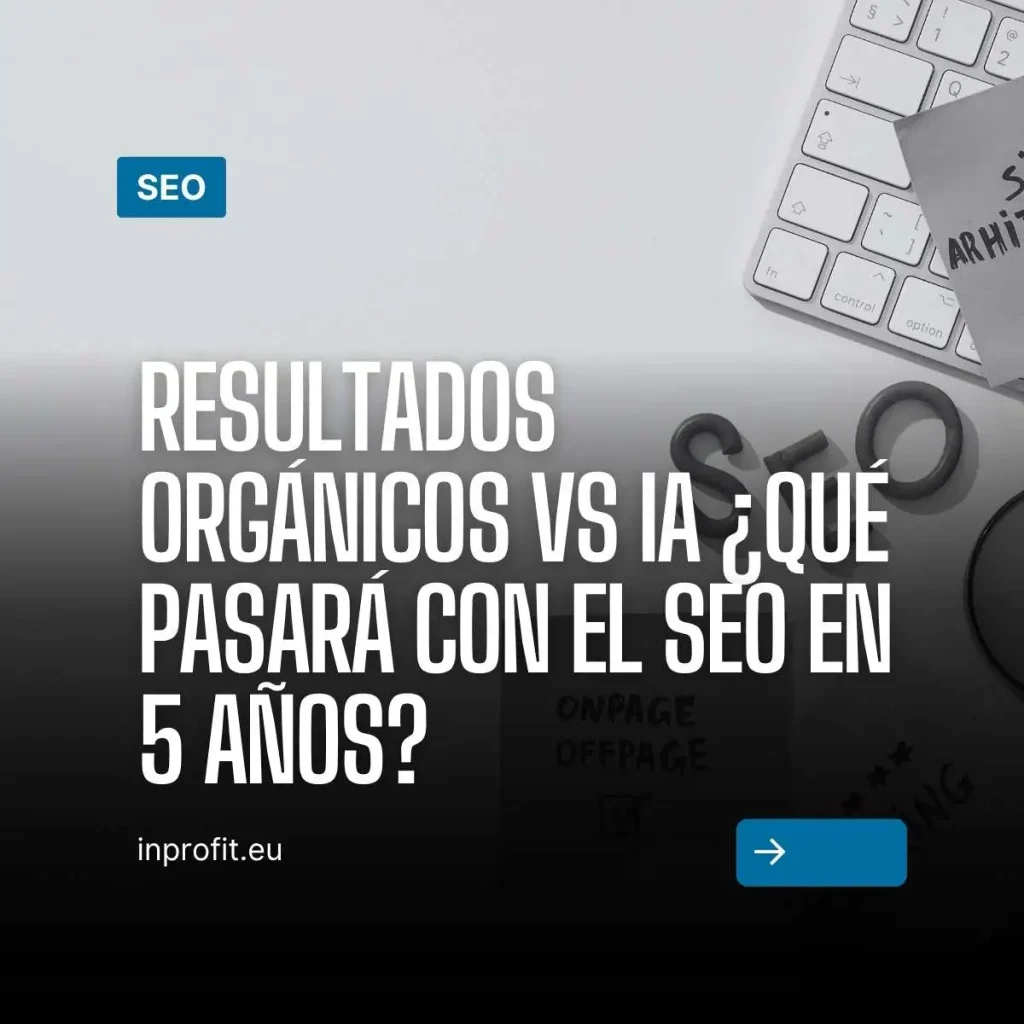Predicting the state of SEO in 5 years involves analyzing current trends in artificial intelligence (AI), search algorithms and user behavior, while acknowledging the uncertainty inherent in rapid technological evolution. Below, I will explore how SEO might evolve in the next five years and whether AI-driven search engines could replace organic results, providing a technical and grounded analysis, followed by a clear conclusion.
Today, SEO is already deeply influenced by AI. Algorithms such as Google’s BERT, MUM and LaMDA have transformed search towards semantic understanding, prioritizing user intent, contextual relevance and content quality (E-E-A-T: Experience, Expertise, Authority, Trust).
Multimodal search (text, voice, images) and generative language models, such as those used in AI assistants (e.g., Grok, ChatGPT), are changing how users access information. These trends offer clues to the future.
What will happen to SEO?
In five years, SEO will not disappear, but it will be significantly transformed. Here’s a breakdown of the major changes expected:
Proficiency in semantic and customized search
Search engines will continue to refine their ability to understand complex queries and deliver hyper-personalized results.
AI will analyze real-time data (search history, location, preferences, social media behavior) to provide tailored responses for each user. For example, a search such as “best restaurant” could generate unique results for each person based on their culinary tastes and consumption patterns.
Impact on SEO:
- Entity-centric content: Optimizing for entities (people, places, concepts) and semantic relationships will be crucial. Sites should use advanced structured data (Schema.org) and build deep topic clusters.
- Hypersegmentation: Companies will need to create content that addresses specific micro-targets, using AI to identify niche audiences.
- Challenge: Extreme personalization could reduce the visibility of generic organic results, as engines will prioritize dynamic or real-time generated content.
2. The rise of conversational and voice search.
With the growth of voice assistants (e.g., Alexa, Siri) and conversational AI models, voice searches and conversational queries will account for a significant portion of traffic (possibly more than 60%, according to projections based on current Comscore estimates). Users will expect direct answers rather than lists of links.
Impact on SEO:
- Optimization for direct responses: Sites should structure content for featured snippets and “position zero” answers. For example, answer questions such as “How to optimize a site for SEO in 2030?” in concise, structured formats.
- Conversational content: Natural language and long-tail queries will dominate. Tools such as AnswerThePublic will be essential to identify these queries.
- Challenge: If AI assistants provide answers without directing to websites, organic traffic could decrease, especially for informational queries.
3. Integration of multimodal and visual search
Visual search (e.g., Google Lens) and the ability to process images, videos, and audio will continue to grow. Search engines will combine multiple formats to answer queries, such as displaying a video tutorial alongside an article for a search such as “how to repair a car”.
Impact on SEO:
- Multimedia optimization: Companies should optimize images (with alt text and structured data), videos (with transcripts and metadata) and audio (e.g., podcasts with rich descriptions).
- Immersive content: Augmented reality (AR) and virtual reality (VR) could be integrated into search results, requiring new content formats.
- Opportunity: Sites that adopt advanced multimedia formats could gain an advantage in visual niches, such as ecommerce or education.
4. AI-generated content
Generative AI (e.g., models such as GPT-5 or successors) will be ubiquitous in content creation, from articles to product descriptions. However, search engines will continue to prioritize E-E-A-T compliant content, penalizing generic or non-value-added material.
Impact on SEO:
- Human-IA hybrid: Successful content will combine AI efficiency with human oversight to ensure originality and depth. For example, use AI for drafts and experts to add unique insights.
- Continuous audits: Tools such as Ahrefs or Screaming Frog will be crucial to identify low quality content that can damage the ranking.
- Challenge: Saturation of AI-generated content could make it difficult to stand out, increasing the importance of brand authority.
5. Greater emphasis on user experience (UX).
Core Web Vitals (loading speed, interactivity, visual stability) will remain ranking factors, but AI will extend UX evaluation. Engines will analyze signals such as dwell time, intuitive navigation and user satisfaction through predictive models.
Impact on SEO:
- Advanced technical optimization: Sites should implement technologies such as Progressive Web Apps (PWAs) and AMP (if still relevant) to maximize speed and accessibility.
- User-centric design: AI will help personalize the site experience in real time, such as adjusting the layout according to the user’s device or preferences.
- Opportunity: Sites with superior UX will gain an advantage in rankings, especially in competitive markets.
Will AI engines replace organic results?
The key question is whether AI-driven search engines, such as generative direct-response models (e.g., ChatGPT, Grok, Perplexity), will replace traditional organic results (lists of links to websites). The answer is nuanced:
Why organic results will not disappear completely
- Economic ecosystem: Organic results are fundamental to the business model of engines such as Google, which relies on contextual advertising (e.g., Google Ads). Removing organic links would reduce traffic to websites, affecting ad monetization and engine relevance.
- Diversity of sources: Users value the ability to explore multiple perspectives. AI engines that only provide synthesized answers run the risk of being perceived as biased or limited, while organic results allow users to verify and compare sources.
- Authority and trust: Established websites with high authority (e.g., universities, recognized media) will continue to be a trusted source of information, and search engines will integrate them into their results to maintain credibility.
Why might AI engines reduce reliance on organic results?
- Direct answers: Generative AI models can answer informational queries (e.g., “What is SEO?”) without the need to direct to a website. This is already the case with featured snippets and answers from assistants such as Siri.
- Conversational interfaces: Users may prefer to interact with AI assistants rather than navigate lists of links, especially for quick or transactional queries (e.g., “buy a ticket to Madrid”).
- Content generated in real time: AI engines could create dynamic content based on web data, reducing the need to index static sites in SEO. For example, an engine could generate a personalized travel guide without linking to external blogs.
Probable scenario
Instead of replacing organic results, search engines will evolve towards a hybrid model:
- AI answers for simple queries: The engines will provide direct AI-generated answers to basic questions, such as definitions or calculations.
- Organic results for deep exploration: Complex or research queries will continue to show links to websites, especially in niches where authority and depth are crucial (e.g., health, technology).
- Integrated advertising: Sponsored ads will remain prominent, possibly mixed with AI responses and organic results.
Strategies for SEO in 2030
To adapt to this future, companies must:
- Invest in brand authority: Building a trusted brand with original, high-quality content will be more important than ever.
- Adopt AI technologies: Use tools such as Synsight Hub predictive analytics platforms to optimize content and anticipate trends.
- Optimize for multimodality: Prepare content for voice, visual and AR/VR search, including rich metadata and immersive formats.
- Encourage direct interaction: Create interactive experiences (e.g., apps, chatbots) to engage users who might not arrive via search engines.
- Monitor regulations: Data privacy (e.g., GDPR) and AI regulations will influence how engines collect and use information.
The SEO of the future will still be relevant, but it will be unrecognizably integrated with AI.
Organic results will not disappear completely, as they are essential to the diversity, trust and economic model of search engines. However, generative AI engines will gain ground, offering direct answers for simple queries and reducing organic traffic in certain cases.
The companies that thrive will be those that combine high-quality content, advanced technical optimization and an exceptional user experience, while leveraging AI to anticipate the needs of their audience.




